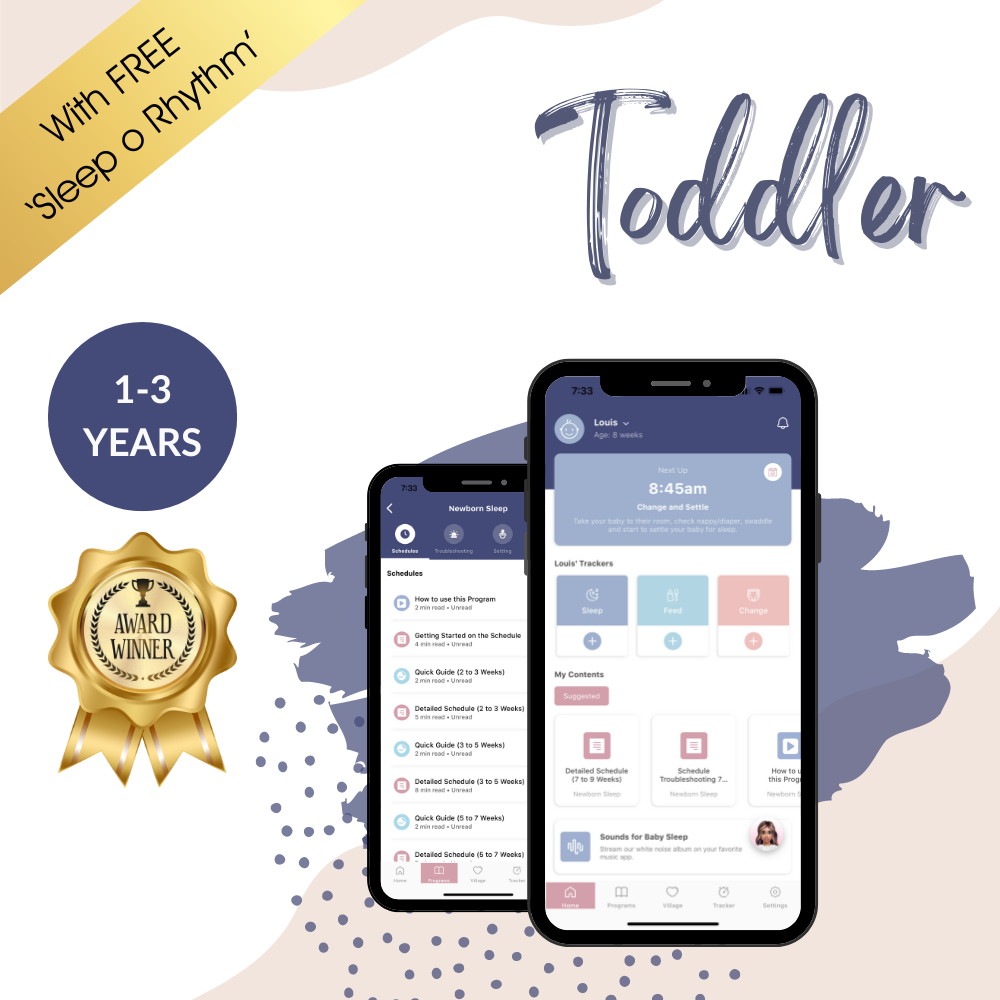
Could it be nightmares or night terrors?
A question we get asked a lot in our Little Ones Village is... “Could it be nightmares?”.
And it’s understandable. If your little one is waking overnight and they are very upset when they wake, it’s easy to attribute their poor sleep to nightmares or night terrors…but how do you know if that's actually what's causing them to wake? And if they are waking due to nightmares or night terrors, what can you do to help?
In this article:
- What’s the difference between nightmares and night terrors?
- Guide to nightmares
- Guide to night terrors
- What else could be waking my little one?
E-Book: Navigating the Preschool Years: Sleep, Behavior & Development for 3 to 6 Year Olds
There is a LOT of growth and development that happens between the ages of 3 and 6 years and your child becomes a pretty amazing, pretty independent little human. There can also, however, be a raft of challenges that accompany these changes (and I know I don't have to tell you that!).
In our comprehensive e-book we'll guide you through your little one's sleep, behaviour and development across these crucial years.
Buy Now
For help with your little one’s sleep and advice on everything from newborn sleep to nightmares, check out our Little Ones App. Here you’ll find age-specific information to help you get to the bottom of why your little one is waking, as well as personalised guidance to improve their sleep... which means more sleep for you too!
What’s the difference between nightmares and night terrors?
You will have heard about nightmares, and have probably even had a few yourself (thanks ‘Nightmare on Elm Street’!). But what about night terrors? How are they different from nightmares... or are they the same thing?
Nightmares and night terrors are actually completely different experiences. What they do have in common is that they both occur during night time sleep.
Nightmares
Chances are you have experienced a nightmare or bad dream at some point in your life... so you know they’re not fun!
Nightmares can occur during your little one's REM sleep (rapid eye movement), however, as their deepest sleep is before midnight, if they do have a nightmare at this time, it's unlikely that they will wake from it. From midnight onwards though, our little ones come into a lighter and lighter sleep, so if a nightmare occurs after midnight, they will likely wake up from it.
Depending on your child’s age and ability to communicate, they may be able to tell you about their nightmare in lots of detail or they may only be able to tell you bits and pieces. If they are younger and their speech is still developing, they may not be able to tell you what's going on and so you have to work it out for yourself that it was a nightmare that has caused them to wake.
Usually with nightmares, children wake completely from their sleep and will often remember the incident in the morning.
We know that, even as adults, nightmares can seem very real and can be very upsetting for us. So imagine how scary they can seem for our children! Around 3 years old, children can begin to understand that nightmares are just ‘bad dreams’ that aren’t real and cannot hurt them. However, even if they understand this concept, they can still be scared of nightmares or afraid to go to sleep.
Night Terrors
As the name suggests, a night terror is pretty terrifying! However, rather than scaring the child like nightmares do, night terrors are so named because they can be terrifying for parents to watch.
Night terrors often occur in the earlier part of overnight sleep, before midnight, when your little one is in their deepest sleep. It can seem like your child is awake during a night terror. They may have their eyes open or will be talking, although they are unlikely to make any sense with what they’re saying.
Signs of night terrors can include:
- Crying or shouting out
- Sitting up in bed
- Thrashing their arms and legs
- Speaking incoherently
- Eyes open, seemingly awake
- Being hot and sweaty
Although it may seem like your child is awake during a night terror, they are actually still sleeping, so they cannot be reasoned with. Night terrors will often last for a few minutes, sometimes longer, then your child all of sudden calms down and can be laid back down to sleep.
The good news is that children rarely have any memory of the incident the next day. So even if you’re still feeling a little wobbly from the experience, your little one will be full of beans and ready to start the day!
Say goodbye to sleepless nights.
Join over 800,000 families worldwide who are enjoying excellent sleep with our Sleep Programs, created by experts in the field of pediatric sleep.
Get our Sleep Programs
Guide to nightmares
When do nightmares start?
Nightmares usually start around 2 years old, which is when children develop their active imagination. This is the age that children can start to also develop rational fears, such as fear of the dark. Around 2 years old, children will also experience a regression in their sleep, which you can learn more about HERE.
As their imagination explodes, you’ll probably start to notice your toddler playing more imaginatively with toys, or using real life objects for other purposes, such as pretending a banana is a phone or a cardboard box is a car. Greater imagination and play, new language development AND a sleep regression... with so much going on in their brains, it’s no surprise that nightmares can start around this time too!
Do babies have nightmares?
Since nightmares require the development of imagination and rational fear, a baby or toddler under 2 years old is not capable of having nightmares. If your baby is crying or whimpering in their sleep, this is a sympathetic nervous system response and usually means something else in unsettling them.
Waking upset doesn't necessarily mean your little one has had a nightmare either - most babies will be upset when they wake unexpectedly overnight! We'll explore some other possible causes for night waking later in this article.
What causes nightmares?
There isn’t necessarily anything specific that causes nightmares, they are often just due to your child’s active imagination developing. However, having screen time too close to bedtime can trigger a child's imagination and interrupt their sleep, so we do recommend avoiding television or tablets for 2 hours before bedtime.
Sometimes nightmares can also occur as a reaction to a traumatic event, such as the death of a loved one, injury or accident, or a big life change like a new sibling or moving home. Nightmares are the brain’s way of processing and working through these difficult situations, or facing fears in a safe space.
How long do nightmares last?
Nightmares can be experienced by both children and adults, as we know. However, they are more common in children. They can occur once a night, or more frequently, for several days or longer and then stop for a period of time.
If after two weeks your little one's nightmares haven’t stopped or they are impacting your child’s health and wellbeing, seek help from a medical professional.
How to help nightmares?
No one wants their little one to experience nightmares or night terrors, but this is a very normal part of your child's development. Although there's no surefire way to stop nightmares, there are still things you can do to try to prevent them and promote a restful night’s sleep for everyone!
Before bed:
- Have a consistent bedtime and relaxing bedtime routine.
- If your little one is still having a nap, make sure this falls at the right time in the day to ensure they aren't under OR overtired at bedtime.
- If your little one is over 2 years old, consider introducing a night light if they’re scared of the dark. A red hued nightlight is the most sleep-promoting. Blue light should be avoided as this inhibits the release of the sleep hormone, melatonin.
- Avoid screen time and sugar in the 2 hours before bedtime.
- Avoid scary programmes or books. This is especially important before bedtime, but even if your child is exposed to these earlier in the day, it can trigger their imagination and cause a nightmare later that night.
- Introduce a cuddly toy to comfort them in the night.
After a nightmare:
- Be calm and reassure your child that you’re there and they are safe.
- Explain what has happened so they understand eg. “You had a bad dream, you’re awake now and everything is okay”.
- Give them a cuddle and offer comfort.
- Resettle them back in bed with their cuddly toy or comforter.
- Suggest some "nice" memories or dreams that they could think about instead.
- Talk about their bad dreams during the day, to reassure them that their nightmares aren't real and can’t hurt them.
Let's get your little one's sleep sorted ASAP!Our award-winning Sleep Programs will solve your baby's sleep challenges in no time.
Get our Sleep Programs
Guide to night terrors
When do night terrors start?
Night terrors can begin around the same age of 2 years old, however, between 4-12 years is more typical. Night terrors can be more common for boys between the ages of 2 and 4 years and this is linked with the surge of testosterone they experience at this age.
What causes night terrors?
Night terrors can be brought on by over tiredness as well as low levels of tryptophan, which is an enzyme that helps to induce sleep. There is no evidence that a night terror episode mean your child is being terrified by something in their sleep and cannot wake from it. Instead, it is thought that night terrors are triggered as your child transitions from one sleep cycle to another and they’re in a very deep sleep.
How long do night terrors last?
Night terrors usually only last for a few minutes and are mainly experienced by children, often between the ages of 2 - 12 years, who tend to grow out of them in time. They can occur once a night, or more frequently, for several days or longer and then stop for a period of time.
If after two weeks your little one's night terrors haven’t stopped or they are impacting your child’s health and wellbeing, seek help from a medical professional.
How to help night terrors?
One of the big triggers for a night terror episode is over tiredness so preventing over tiredness will go a long way towards preventing night terrors too!
Before bed:
- Have a consistent bedtime and relaxing bedtime routine.
- If your little one is still having a nap, make sure this falls at the right time in the day to ensure they aren't under OR overtired at bedtime.
- Avoid screen time and sugar in the 2 hours before bedtime.
- Offer foods containing high levels of tryptophan during the day such as: sour cherries, bananas, turkey and dairy products.
- If your child is having the night terror at the same time each night, try rousing them 15 minutes beforehand by gently stroking their face or hand. This can help them to drift into their next sleep cycle without experiencing the night terror.
During a night terror:
- Stay calm and remember that your little one isn't awake or scared.
- Stay with them to make sure they are safe, especially if they are thrashing around.
- Avoid physically restraining your child, as this can do more harm than good.
- Reassure them with your voice. They won’t be able to hear you or process what you are saying but it can help you to feel useful.
- When the night terror stops, lay them back down or resettle them back to bed.
- Avoid waking your child up to check that they are okay, as this is often more disorientating and upsetting for them.
What else could be waking my little one?
Okay so if you’ve ruled out nightmares and night terrors…WHAT is it that’s causing your child to wake overnight?
If your child is younger than two years old, they won't be experiencing a nightmare or night terror - they are simply too young! If they are whimpering or crying in their sleep, but not waking, this is usually a sympathetic nervous system response and means something else is unsettling them. The most common culprits are:
- Temperature - too hot or too cold
- Sickness
- Discomfort (trapped wind, uncomfortable digestion, reflux etc.)
- Over tiredness
If your baby is actually waking up at night and this is happening frequently, this is more likely due to either under or overtiredness and simply means their naps need a bit of tweaking. Our Little Ones App can help with this, with evolving, age-appropriate sleep schedules to help ensure great sleep day and night for your little one.
If your baby has started waking every 2 hours overnight, especially from 4 months onwards, this can also indicate a settling issue. At this age, your baby's sleep patterns have matured and they will begin to wake fully in between sleep cycles overnight. Guiding your baby towards self-settling gives them the best chance at resettling themselves back to sleep in between cycles.
Conclusion
For most children, nightmares and night terrors are a passing phase that comes as part of growing up and just requires your support and comfort. However, if your child’s sleep is being significantly impacted by nightmares or night terrors and it is beginning to have an effect on their daytime behavior and emotional wellbeing, do reach out to your healthcare professional for further medical advice.
If you’d like further support with your child’s sleep or feeding, you will find all the information and tools you need in our Little Ones App. You’ll also have access to the Little Ones Village, where our certified sleep consultants can help you to navigate these tricky periods in your little one’s sleep.
_______
Bibliography
HPRC (2017). “Screen time” impacts dream time. https://www.hprc-online.org/mental-fitness/sleep-stress/screen-time-impacts-dream-time
NHS Choices. (2022). Night terrors and nightmares. https://www.nhs.uk/conditions/night-terrors/
University of Rochester Medical Center (2022). Nightmares & Night Terrors - Health Encyclopedia. https://www.urmc.rochester.edu/encyclopedia/content.aspx?contenttypeid=90&contentid=P02257





